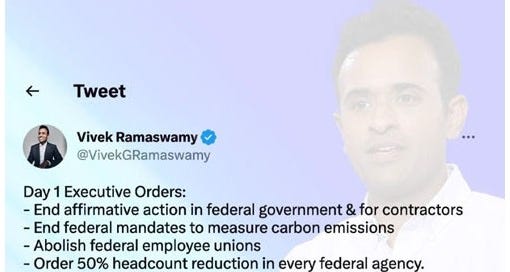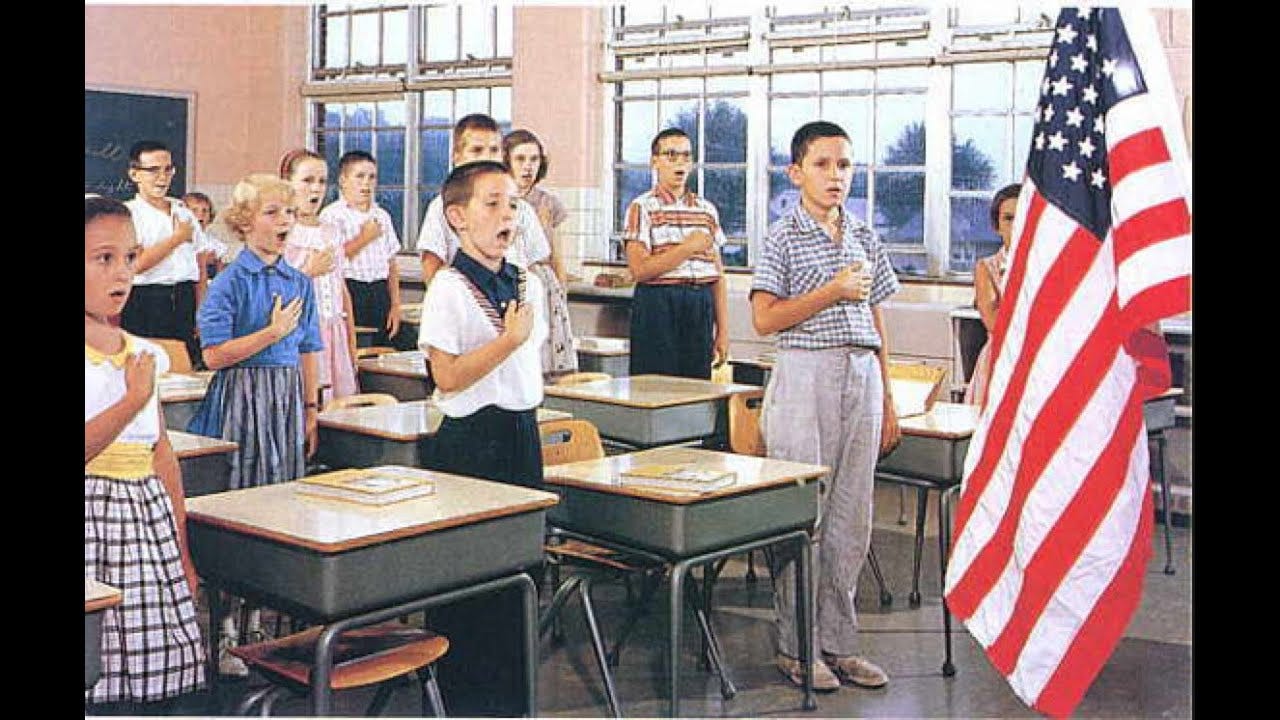"Universal Service" Makes a Comeback
GOP Presidential candidate Vivek Ramaswamy introduces a new wrinkle on an old concept, with "Civic Duty Voting." Good for him.
It’s not usually a good idea to propose Constitutional amendments as part of a political campaign. They are hard to take seriously and even harder to pass - by design - requiring either a supermajority vote in Congress or 34 states agreeing to an Article V convention of the states. Few voters seem to take them seriously.
And then it gets tougher. Thirty-eight states - three-fourths of the current 50 states - would be required to ratify whatever Congress or a convention of the states would propose. That’s a high bar and the major reason why a “constitutional convention” doesn’t worry me. If they do stupid stuff or go off the rails, more than 13 states will say no, and nothing will happen. Constitutional amendments require broad national consensus, as they should.
The current movement for a Constitutional Convention of the States - there’s actually an organization pushing for it - was inspired by Constitutional lawyer and radio talker Mark L. Levin. He’s proposed 11 “Liberty” amendments. I like them all, especially repealing the 17th Amendment, which provided for the direct election of Senators.
Of course, the Constitution has been amended over our nation’s history, starting with the first one, our Bill of Rights. Twenty-seven times, in fact, the last one some 30 years ago. And that one, prohibiting any congressional pay raises from taking effect until after the next election, had a nearly 203-year odyssey. Originally proposed in 1789 by James Madison, it was resurrected thanks to the work of Gregory Watson, a 19-year-old sophomore - excuse me, “second-year student” - at the University of Texas at Austin.
But GOP presidential aspirant Vivek Ramaswamy has made a new Constitutional amendment a centerpiece of his aggressive, policy-focused campaign to establish “Civic Duty Voting.”
It represents an interesting new twist to an old idea - universal service, or as some call it, “mandatory” or “compulsory” service, although there’s nothing compulsory about Ramaswamy’s proposal.
Here’s what it says (from his campaign website):
In substance, this amendment will increase the standard voting age to 25, while still allowing all Americans to vote at age 18 if they meet a national service requirement (at least 6 months in the military or a first responder role) or else pass the same civics test required of naturalized citizens.
Voting will remain open to citizens starting from the age of 18 who are US and have demonstrated civic information in at least one of several ways:
Direct service to the country in the military or first response services (police, fire, etc).
Passed a civic test identical to the U.S. citizenship exam for naturalized citizens.
Reached the age of 25.
Let’s be clear. This will (probably) never see the light of day. If it grew legs, or Vivek’s campaign was ever to take off, he would be accused of “voter suppression.” Democrats are making registering, voting, and cheating easier (election day registration, a horrible idea since registrars cannot adequately verify addresses, citizenship, etc.) for 18-21-year-olds, especially those concentrated on college campuses. Every idea Democrats put forth into making voting easier is designed to benefit them.
But the real idea is “civic duty,” and that’s a very legitimate concern.

Civic duty and education have practically disappeared from many secondary and higher education curricula over the past several years. We’ve all seen “man on the street” interviews where passers-by were asked to identify a certain politician or answer a basic fact about American history. We’ve laughed at some of the responses. But sadly, they reflect a high level of civic ignorance that may be further reflected in election results - if people even vote.
Earlier proposals for a universal service “mandate” arose shortly after our nation instituted an all-voluntary military in the mid-1970s. Opposition to the Vietnam War drove much of that. And until recently, our military hasn’t had any problem meeting recruiting targets (the Marine Corps, the smallest of our military branches, still doesn’t). That’s changed.
“The Army, Navy and Air Force are preparing to miss their recruiting goals by thousands this year, service leaders said Wednesday.
“The Army is projecting the largest shortfall of all, as it did last year, proving to be the bellwether for recruiting crunches across the armed services, at a time when the Defense Department is trying to grow its overall ranks by about 12,000.”
And that’s not all. Ambulance, EMT first responders face ‘crippling workforce shortage,’ blares a headline yesterday in TheHill.com. “Our nation’s EMS system is facing a crippling workforce shortage, a long-term problem that has been building for over a decade. It threatens to undermine our emergency 9-1-1 infrastructure and deserves urgent attention by the Congress,” several emergency responder organizations recently wrote.
Five years ago, the Institute for Citizens and Scholars commissioned a study in 2018 by Lincoln Park Strategies on whether Americans could pass the same citizenship exam required of naturalized citizens. It only requires a passing score of 60 percent. After being read a sample of multiple choice questions from the test, only 36% could pass.
Only 13 percent of those surveyed knew when the U.S. Constitution was ratified (June 21, 1788, thanks New Hampshire), even on a multiple-choice exam similar to the citizenship exam, with most incorrectly thinking it occurred in 1776. More than half of respondents (60 percent) didn’t know which countries the United States fought in World War II (um, Germany, Italy, and Japan). And despite the recent media spotlight on the U.S. Supreme Court, 57 percent of those surveyed did not know how many Justices actually serve on the nation’s highest court (nine, for now).
I guess people actually believed John Belushi’s (future US Senator John Blutarski’s) line from Animal House about when the Germans bombed Pearl Harbor. . .
Here are some other disturbing results from the survey. And this was from five years ago. Do you think it’s gotten any better since?
Seventy-two percent of respondents either incorrectly identified or were unsure of which states were part of the 13 original states (hint: it did not include Vermont);
Only 24 percent could correctly identify one thing Benjamin Franklin was famous for (discovering electricity, maybe?), with 37 percent believing he invented the lightbulb (obviously, that was Thomas Edison);
Only 24 percent knew the correct answer as to why the colonists fought the British (um, independence, maybe?);
Twelve percent incorrectly thought WWII General Dwight Eisenhower led troops in the Civil War (guess again, about 80 years later); 6 percent thought he was a Vietnam War general (guess again, about 20 years before); and
While most knew the cause of the Cold War, 2 percent said climate change.
Take a bow, seniors: “Surprisingly, the poll found stark gaps in knowledge depending on age. Those 65 years and older scored the best, with 74 percent answering at least six in 10 questions correctly. For those under the age of 45, only 19 percent passed with the exam, with 81 percent scoring a 59 percent or lower,” the study showed.
That’s not surprising at all, sadly. Only 23 percent of Americans aged 18-25 even vote. Maybe we should explore why seniors know so much more than younger voters. And don’t tell me it is because we’re all “retired” and have “more time.” Maybe it’s because we manage our time better, and we’re brought up in public schools where we started every morning with the Pledge of Allegiance and prayer—just a guess.
This is more evidence that our public school systems are a disaster and fail to prepare children for the real world and to function as citizens in our constitutional republic.
Kudos to states like Arizona that now require high school students to pass a civics test) identical to the civics portion of the naturalization test used by the U.S. Citizenship and Immigration Services, getting 60 percent correct. Congress could go the next step and require such testing as a condition for receiving federal funds. I’d love to see the roll call vote tally on that idea.
Fifteen states now require a high school civics test for graduation. It’s a start. Kudos to Ramaswamy for making it an issue, even if his idea of a Constitutional amendment on civic duty voting is probably a dead letter.
God bless candidates who run issue and policy-driven campaigns. They make people think. Hopefully.






Agree